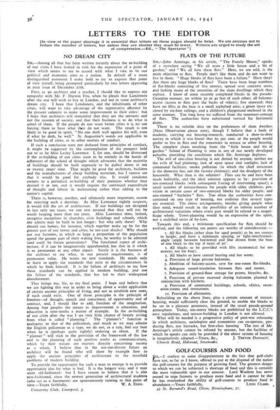LETTERS TO THE EDITOR
[In view of the paper shortage it is essential that letters on these pages should be brief. We are anxious not to reduce the number of letters, but unless they are shorter they must be fewer. Writers are urged to study the art of compression.—Ed., " The Spectator "j
NO DREAM CITY
Six,—Among all that has been written recently about the re-building of our cities I have looked in vain for the expression of a point of view which seems to me to accord with what I take to be our political and economic aims as a nation. In default of a more distinguished statement I make bold to try to express that point of view myself, being prompted particularly by two letters appearing in your issue of December 27th.
First, as an architect and a teacher, I should like to express my sympathy with Mr. F. Darwin Fox, when he pleads that Londoners after the war will wish to live in London, and not in some architect's dream city. I hove that Londoners, and the inhabitants of other cities, will want to take advantage of the opportunity afforded by the present calamity to make some improvement in their cities: but
I hope that architects will remember that they are the servants and not the masters of society, and that their business is to do what is asked of them. If the people do not want better cities it is no use forcing them to have what they do not want. The result is not likely to be good in spirit. " No one doth well against his will, even if what he cloth, be well." St. Augustine's words are applicable to the building of cities, as to other matters of conduct.
If such a conclusion were not deduced from principles of conduct, it might be suggested by the contemplation of the prospect held out to us by Miss Lesley Lawrence. I, for one, should be distressed if the re-building of our cities were to be entirely in the hands of adherents of the school of thought which advocates that the majority of buildings should be built expressly to be pulled down in ten or twenty years' time. That might be good for architects, builders and the manufacturers of cheap building materials, but I cannot see that it would be good for anybody else. It would condemn owners to a periodical re-building of their premises whether they desired it or not, and it would require the continued expenditure of thought and labour in maintaining rather than adding to the nation's capital.
There is, however, another, and ultimately more important, reason for rejecting such a doctrine. As Miss Lawrence rightly suspects, it would kill the art of architecture. If our buildings are designed to last only ten years, we can rest assured that they will not be worth keeping more than ten years. Miss Lawrence does, indeed, recognise exceptions in churches, civic buildings and schools, which she admits may be built to last longer: but why only these? Why should our homes, for instance, which together make up by far the greater part of our towns and cities, be ten-year shacks? Why should not our factories, in which so large a proportion of the population spend the greater part of their waking lives, be worthy to be admired (and used) by future generations? The functional aspect of archi- tecture, if it can be imaginatively apprehended, has that in it which is as permanent as any other aspect. Surely it is the business of the architect to see what, in our present requirements, is of permanent value. He wants no new standards. He needs only to learn to apply the standards that exist to the circumstances in which he finds himself. It is the failure of architects to see how those standards can be applied in modem building, and not the failure of the standards, that has led to their widespread abandonment.
That brings me, Sir, to my final point. I hope and believe that we are fighting this war in order to bring about a wider application of certain ancient principles of living, and not to establish new ones, if such could exist. One of those principles is the principle of freedom—of thought, speech and conscience, of opportunity and of contract, and, I should like to add, freedom of the imagination. Among free peoples the means to improvement is education, and education is nine-tenths a matter of example. In the re-building of our cities after the war I see very little chance of beauty arising from what is called " planning." The " planner's " function is analogous to that of the policeman, and .much as we may admire the English policeman as a type, we do not, as a rule, feel our best
when he is (perhaps quite rightly) ordering us about. If the " planner " will stick to the provision of the framework of the law and to the planning of such positive works as communications, which by their nature are matters directly concerning society as a whole, I believe that in the not-too-distant future an architect will be found who will show by example how to apply the ancient principles of architecture to the manifold problems of modern building.
To provide the opportunity for such a man to emerge is to provide opportunity also for what is bad. It is the longest way, and it may seem old-fashioned: but I have reason to believe that it is also new-fashioned, since the newest generation of architectural students (who act as a barometer) are spontaneously turning to this point of


























 Previous page
Previous page